
Occupy Central
Occupy Central is a civil disobedience movement which began in Hong Kong on September 28, 2014. It calls on thousands of protesters to block roads and paralyse Hong Kong's financial district if the Beijing and Hong Kong governments do not agree to implement universal suffrage for the chief executive election in 2017 and the Legislative Council elections in 2020 according to "international standards." The movement was initiated by Benny Tai Yiu-ting (戴耀廷), an associate professor of law at the University of Hong Kong, in January 2013.
OCCUPY CENTRAL - DAY 59: Full coverage of the day’s events
PUBLISHED : Monday, 24 November, 2014, 3:14pm
UPDATED : Tuesday, 25 November, 2014, 3:37am
For those who dare, Hong Kong remains the place to be
Peter Kammerer says while he shares protesters' frustrations with high-priced housing, he believes opportunities are there for the taking
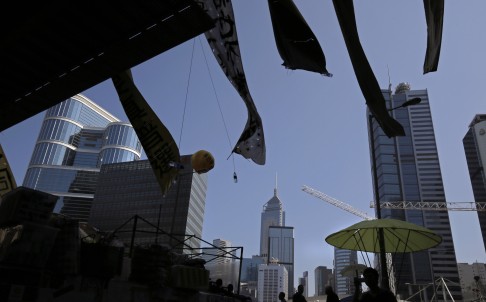
Generations are different in the way they think, but their aspirations have always been the same: to own a place that they can call their own. I'm more than half a century old and I still don't have that. Circumstances got in the way, among them raising two children and some poor investments, but that doesn't mean I can't afford a flat. If I quit my job, I could turn 25 years of pension into a 600 sq ft box in Tseung Kwan O or Kornhill. If I did that, my dilemma would be: what now?
I would be 52 and have little in the bank, necessitating years more work to save for my eventual retirement at an age perhaps well beyond 70. For the sake of owning a home, I would have to count on winning the lottery or getting lucky with the stock market to feel comfortable about my future. The alternative: get out of Hong Kong and go somewhere where the property and cost of living are more affordable. That's obviously easy for someone with a foreign passport to say.
With such options, it is not difficult to be sympathetic towards the protesting students. Leaving the city they were born and raised in, and love, is not an option for the majority. Look beyond their desire for genuinely democratic elections and it is about the future. With property prices at record highs, good jobs in short supply for anyone other than the best graduates from the top universities, and tourists seemingly of greater importance than citizens to the government, there is every reason to be unhappy.
They have a right to be angry - unlike those of us who got their feet on the ladder in easier times, they are at the bottom and have what appears an impossible climb. It especially rankles that it is government officials who live in the lap of luxury who are telling them that they can't have what they want. But let's get real - only those who are well-heeled and have connections can get what they want, and Hong Kong is far from being the only place in the world like that. It's also tough for the young in Europe, the US and any other place where desirable jobs are in short supply and housing prices steep.
The best jobs are usually to be found in big cities and that's where housing costs are highest. Low interest rates haven't helped; flats have for some time been one of the best places to invest and that exacerbates circumstances. Throw in Hong Kong's land shortage, government control of supply and the exorbitant cost of what it releases and the recipe is unpalatable for the have-nots. Those with guaranteed jobs and annual pay rises, and access to great perks - civil servants, many of whom end up in the top echelons of government, are such people - are the ones with the best chance of getting what they want.
It's all about being a realist. I've had opportunities to join the housing haves, but either passed them up or was unlucky. There's always another occasion or time. It's a matter of being patient and, when seeing a chance, taking it.
There aren't many cities like Hong Kong. Those with a smart idea and the drive to succeed will always find a way to get ahead. The business environment gives every opportunity. The housing scene is not so kind, but doors open to those who are willing to learn and are patient.
Peter Kammerer is a senior writer at the Post
This article appeared in the South China Morning Post print edition as Those who dare
PUBLISHED : Tuesday, 25 November, 2014, 5:10am
UPDATED : Tuesday, 25 November, 2014, 5:38am
Patten can speak out but reform is up to Hong Kong
Chris Patten faulted officials for failing to engage student leaders. Photo: AFP
Like many Hong Kong people, I am fond of "Fat Pang", our last governor. So unlike Beijing loyalists and others who are firmly in the pro-establishment and government camps, I am not ready to dismiss out of hand the many home truths that Chris Patten told a US commission last week - as well as statements he recently made to British lawmakers - about our city.
But on the other hand, he also takes a completely "pan-democratic" stance and makes some disingenuous statements difficult to square with realities on the ground here.
Who can argue with him when he said officials had failed to show "statesmanship"? It would be unfair to blame every major problem Hong Kong now faces on Chief Executive Leung Chun-ying, but he has shown a singular lack of leadership and complete inability to communicate with the public. His weaknesses have been especially exposed by the Occupy movement, our worst political crisis since the handover. Unfortunately, you can say the same about pan-democratic leaders in the legislature who have completely failed to rise to the occasion and gain political capital out of the protests. In fact, they appear even more clueless and obstructive than before.
Patten also faulted officials for failing to engage student leaders. But the students are unwilling to compromise and the government is unable to move forward without Beijing's sanction. Any further talks would have been futile other than as a show of good will. Patten is right that Britain has obligations towards Hong Kong - honour bound as he puts it - under the Joint Declaration. But which obligations need to be honoured here? He is too seasoned and professional a politician to say Beijing has breached the joint treaty, yet he has certainly created that impression.
The alleged breach or breaches are taken as axiomatic without the need for proof in pan-democratic circles. This is a large topic that warrants a separate column. Suffice to say it would be very difficult and unrealistic for Britain to take action against China for alleged breaches even if it were so inclined. The real battle is over interpreting the Basic Law for political reform, but that is really a domestic matter in which Britain, or any other country, has no part.
This article appeared in the South China Morning Post print edition as Patten speaks out, but reform is up to us
Clearance operation begins to shift Hong Kong protesters from key Occupy site
Officers to give their 'fullest support' to bailiffs reclaiming protest site today, but do not expect violence as most protesters say they will retreat
PUBLISHED : Tuesday, 25 November, 2014, 5:11am
UPDATED : Tuesday, 25 November, 2014, 11:15am
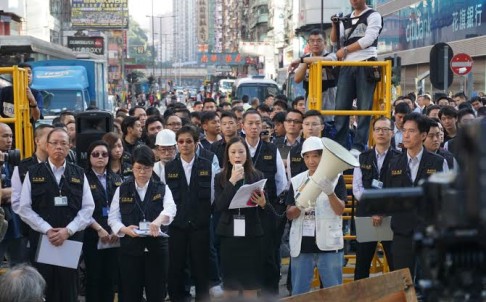
Pro-democracy protesters were told to leave as bailiffs announced the start of the clearance operation in Mong Kok, with one lawyer warning that their belongings would be "dealt with as rubbish".
A team of about 20 bailiffs arrived at 9.20am at the intersection of Argyle Street and Nathan Road, together with Maggie Chan Man-ki, the legal counsel for Chiu Luen Public Light Bus Company, which obtained an injunction to clear Argyle Street.
Chan immediately read out the court order, followed by a bailiff who announced protesters would have 30 minutes to pack their belongings.
"Occupiers should pack up and leave now. Otherwise, [their belongings] would be dealt with as disposed items and rubbish," Chan said.
She warned protesters not to intervene with bailiffs' actions, or else police might step in. Protesters would face contempt of court, she added.
In response, protesters in masks and helmets shouted: "I want true elections" and "We want real suffrage". They also held up three fingers - a protest reference from the sci-fi film The Hunger Games, in which fictional denizens rise up against an authoritarian regime.
Hong Kong Federation of Students representative Yvonne Leung shot back questions at the minibus group's lawyer using a megaphone. "I want to ask if Chan can show me the map first," Leung said, adding Chan should clarify which area they intend to clear and what would constitute "obstructive behaviour".
"They need to label the cleared barricades. Otherwise they are abusing their duties," Leung said of the bailiffs in a later interview. She said she would stay in Mong Kok with about five other HKFS members.
An hour later, at 10.30am, the bailiffs, clad in white helmets and wearing gloves, began tearing down the barricades at the intersection, near the HSBC building. They cut the plastic cordons, tape and strong adhesives that held the barricades in place, and confiscated wooden pallets, fencing and umbrellas.
Protesters made no moves to resist.
After hearing the injunction order, student Kim Ng, 20, said though the clearance was imminent, "we'll keep doing what we can to show our determination [for free elections] as they clear the site" by chanting slogans and holding up banners.
Some protesters have donned protective equipment including helmets and masks, in a sign that some are wary of the possibility of a forceful clear-out.
"I'm confident our people won't clash with [the police]. But I can't say the same for the other side," said protester Zero Lam Tat-wing, adding that he believed many protesters would return to retake the streets, in a different area, if the Argyle Street camp is dismantled. Several tents still remain in the zone.
About 3,000 police officers will be on standby this morning to help bailiffs enforce an injunction order to reopen the area of Argyle Street occupied by democracy protesters.
The operation, which may last two days or more, will also include clearance of blockades set up along Nathan Road, a police source said yesterday.
At 7am today, at least 80 police officers were standing by at the intersection of Nathan Road and Argyle Street and another 20 on the junction of Argyle and Portland Street. Throngs of journalists had also arrived on the scene.
Protester Ken Chu, wearing a full gas mask, said he put on his "defence equipment" as a precaution. "In the past, police have treated protesters with sudden and inappropriate force. I hope there will be no such case today as police are only here to assist bailiffs," said Chu.
"I of course will stay till the end. If bailiffs try to move [the barricades], I will inquire what my rights are and what their objective is," he said.
However, the police force foresaw little likelihood of violence and officers would not get directly involved unless protesters resisted bailiffs' enforcement of injunctions or more hands were needed to carry away obstacles, the source said.
"[The protesters] also want to leave. It will only be a show if there's any resistance," the source said as the Occupy movement, demanding democracy and the right of voters to nominate candidates for the 2017 chief executive election, entered its 58th day.
"They will be given sufficient warning and time to leave before any arrest is made."
Apart from the bus firm, two taxi groups were granted a similar injunction in respect of Nathan Road.
Earlier this morning, protesters moved tents and supplies from Argyle Street to Nathan Road, two hours ahead of a clearance operation.
Police said last night they would give "the fullest support" to the bailiffs in their execution of the court orders and would take "resolute action" if anyone resisted or tried to return to the cleared zones or occupy other areas.
The source said police still aimed to start clearing Mong Kok's main occupation zone on Nathan Road tomorrow.
Officers will be deployed in Mong Kok two hours before bailiffs start removing obstacles at 9am today.
The crowd in Mong Kok remained peaceful yesterday, as two bailiffs and a legal representative from Kwong and Associates, for the taxi groups, arrived to put up injunction orders.
People Power lawmaker Albert Chan Wai-yip said some of the group's members would stay and surrender to arrest.
But most protesters said they intended to retreat.
Psychology student William Yu, 20, said there was no point resisting and getting arrested.
"I'll stay until the last moment. When they ask me to go, then I'll leave," he said.
Yu said he would be happy to accept alternative proposals to help Hong Kong achieve a real election but he had become fed up with the government's lack of response.
Protester Amy Pat, 19, said she had already asked her friends and people at resource stations to pack.
But accounting student Water Lee, 20, said he would try to stop the removal if enough people supported the idea.
"If I were afraid [of being arrested], I wouldn't have been out here over the past month," he said, insisting on both public nomination and the scrapping of the Legislative Council functional constituencies.
Meanwhile, police removed the tents and other belongings of about 20 pro-democracy protesters from a section of pavement outside the British consulate on Supreme Court Road in Admiralty at around 7am yesterday.
The group had occupied the vehicle entrance since Friday. Most of them moved to a nearby demonstration area designated by police after a warning from officers. One protester was carried away by officers but returned to the demonstration zone.
Additional reporting by Danny Mok
This article appeared in the South China Morning Post print edition as Operation Mong Kok: 3,000 police deployed
PUBLISHED : Tuesday, 25 November, 2014, 12:40pm
UPDATED : Tuesday, 25 November, 2014, 12:42pm
Million dollar question: What’s next for the Umbrella Movement?
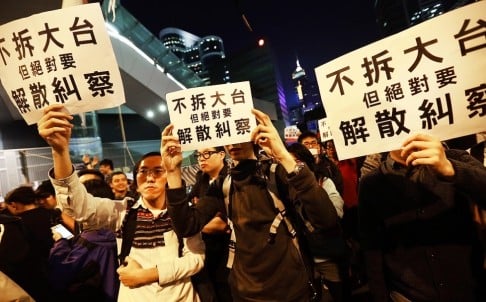
A week ago, a small army of masked men gathered outside the Legco Building at Admiralty in the dead of night. They were upset, so they claimed, over a copyright amendment bill that would limit the freedom of expression on the Internet. The angry men smashed a pair of glass doors at the north entrance and urged student protesters nearby to occupy the legislature. But the students didn’t heed their call. Instead, Occupy Central marshals were dispatched to block the break-in. Minutes later, police moved in with pepper spray and batons, and the men quickly fled the scene.
What appeared to be a clumsy “wreck-and-run” operation by a few agitators has ignited a political firestorm for the Umbrella Movement. Since last week’s incident, self-proclaimed “netizens” have been showing up at Admiralty in droves, challenging the student leadership and demanding that the marshal team be disbanded. Siding with the masked men, they argue that Alex Chow (周永康), Joshua Wong (黃之鋒) and their likes have gotten too comfortable sleeping in their tents, and that they and the self-appointed marshals are now standing in the way of the movement. Not since the Lung Wo Road confrontation with police a month ago have tensions at Admiralty been this high.
No one knows who the masked men and their supporters are – whether they are concerned citizens or members of nativist group Civic Passion (熱血公民) wanting their 15 minutes of fame. What we do know, however, is that there is now a protest within a protest, and a revolution within a revolution that is threatening to tear the movement apart. The emergence of a splinter group has laid bare a critical question facing the leadership: Should they raise the stakes instead of indefinitely prolonging the street occupation without a clear goal?
Indeed, the Umbrella Movement seems to have hit a plateau – or is stuck in a rut, depending on your personal views. Protesters have been camping out on the city’s major arteries for two months. Even though stories of students doing homework at makeshift libraries, recycling water bottles into handicrafts, and generating electricity on exercise bikes are all very nice, critics fear the campaign is veering off track. At some point, denizens of Umbrellaville need to wake up to the reality that occupying city streets is a means rather than an end, and that the ultimate goal is universal suffrage and not some eco-friendly utopian lifestyle. As much as some of us would like the movement to go on forever, it has to end someday, somehow.
No one understands that better than the student leaders. A recent poll conducted by the University of Hong Kong found that 83 per cent of citizens wanted the students to go home. What’s more, 68 per cent would like the government to clear the sites if they don’t do so voluntarily. The rapid shift in public opinion now leaves the leadership with three options: (A) vacate, (B) negotiate, or (C) escalate.
I take no issues with Option A. In the past, I have argued that the success of Occupy Central as a post-modern political movement is measured not by tangible results but by the social awakening it brings about. On that account, the students have already achieved a great deal by arousing the youths’ interest in local politics. Packing it in at this point should not be viewed as a failure, but a chance to regroup and re-strategize. Considering how politically sensitized the city has become, Hong Kongers will be ready to re-deploy on a moment’s notice for the next chapter in our fight for democracy. These views notwithstanding, many protesters find the first option anticlimactic and even defeatist. They believe that going home now will kill both their momentum and the dwindling leverage they have over Beijing.
Turning to Option B, neither the government nor the student leadership has sat down since the 21 October talks, where both sides seemed more interested in addressing television viewers than each other. Whether we like it or not, the best way – and perhaps the only way – to break the political impasse is to talk constructively about the composition of the nomination committee as stipulated in Article 45 of the Basic Law. While that is a pragmatic solution, it also requires enormous political courage from the student leaders. Conceding to a committee-based nomination mechanic will be viewed by some protesters as a compromise on principles. And compromise, like it is in American politics, has become a dirty word in Hong Kong these days. Between paying a political price and maintaining the status quo, the leadership has so far chosen the latter.
That leaves them with Option C. As is the case for many social movements, there is nowhere to go but up. To raise the stakes, the leadership can choose from a number of classic tricks in the playbook: organise a mass hunger strike, picket government offices or take over the legislature, like the way students in Taiwan did during the Sunflower Revolution. But none of that will work unless the timing is ripe and the stars are aligned. Escalation requires careful planning, skillful execution and, most of all, a spark, like the arrest of Joshua Wong and the deployment of tear gas on 28 September that had started it all. Any attempt to up the ante without an emotional trigger to galvanize the city would end up like last week’s half-baked operation to storm the Legco Building – it will be doomed to fail.
Many have poured our hearts into the Umbrella Movement. Two months in and with the protests now showing cracks, it is time we used that other muscle we have and help the students – and they really are just students – figure out a way forward. There is no cash prize for answering the question of “what’s next,” but there is a high price to pay if we don’t.
First Occupy site cleared as angry Hong Kong protesters stand watch
Officers to give their 'fullest support' to bailiffs reclaiming protest site today, but do not expect violence as most protesters say they will retreat
PUBLISHED : Tuesday, 25 November, 2014, 5:11am
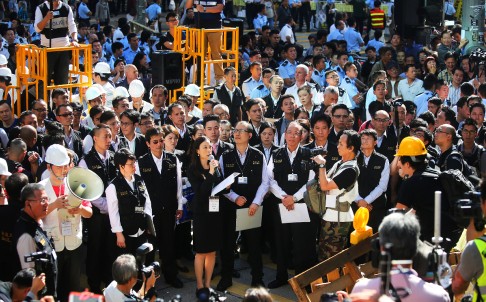
Hong Kong bailiffs tasked to enforce a court order against a key protest camp have successfully torn down barricades at an intersection in Mong Kok, after a tense face-off with pro-democracy demonstrators.
The 20-man "removal team" cleared the juction of Argyle Street and Nathan Road in just 45 minutes. They cut the plastic cordons, tape and strong adhesives that held the barricades in place, and confiscated wooden pallets, fencing and umbrellas.
With the barricades cleared at around 11.15am, the bailiffs breached the protest zone and moved to dismantle remaining tents.
Watch: Hong Kong bailiffs and police clear Mong Kok Occupy site
Police officers, deployed to assist the bailiffs if necessary, formed a line at the intersection to prevent demonstrators from reoccupying the area. Minutes later, some officers, yelling "Open the road", began pushing back protesters in an apparent attempt to clear a passage for debris to be carried away to a waiting truck.
However, the passage wasn't used, prompting Federation of Students activist Yvonne Leung to question why police "stepped in".
"Police should explain when it's right to intervene," she said, adding the court document requires police to disclose when and if their assistance is requested by the bailiffs. "The protesters have the right to know."
One of the bailiffs confirmed they asked for police assistance, but did not say why.
Hours into the operation, the bailiffs' action slowed down somewhat as they were faced down by hordes of protesters, who demanded they be allowed to personally move a stack of wooden boards which was used as a "stage". Some Occupy supporters also loudly complained that the injunction was "not clear enough".
After negotiations between student activists and the removal team, the demonstrators were given 30 minutes to do the job.
Chief Executive Leung Chun-ying, speaking to the Executive Council this morning, said he believed the police would handle the clearance professionally. “I have full confidence in the police’s professionalism and its law enforcement,” he said.
The clearance had kicked off in earnest at about 10.30am, about an hour after the bailiffs arrived and lawyer Maggie Chan Man-ki, the legal counsel for Chiu Luen Public Light Bus Company which obtained an injunction to clear the street, read out the court order.
A bailiff gave protesters 30 minutes to pack their belongings.
"Occupiers should pack up and leave now. Otherwise, [their belongings] would be dealt with as disposed items and rubbish," Chan said.
She warned protesters not to intervene with bailiffs' actions, or else police might step in. Protesters would face contempt of court, she added.
In response, protesters in masks and helmets shouted: "I want true elections" and "We want real suffrage". They also held up three fingers - a protest reference from the sci-fi film The Hunger Games, in which fictional denizens rise up against an authoritarian regime.
Federation of Students representative Leung shot back questions at the minibus group's lawyer over megaphone. "I want to ask if Chan can show me the map first," Leung said, adding Chan should clarify which area they intend to clear and what would constitute "obstructive behaviour".
"They need to label the cleared barricades. Otherwise they are abusing their duties," Leung said of the bailiffs in a later interview. She said she would stay in Mong Kok with about five other HKFS members.
Protesters made no moves to resist as the removal team, clad in white helmets and wearing gloves, began tearing down the barricades at the intersection, near the HSBC building.
Student Kim Ng, 20, said: "We'll keep doing what we can to show our determination [for free elections] as they clear the site" by chanting slogans and holding up banners.
Some protesters have donned protective equipment including helmets and masks, in a sign that some are wary of the possibility of a forceful clear-out.
"I'm confident our people won't clash with [the police]. But I can't say the same for the other side," said protester Zero Lam Tat-wing, adding that he believed many protesters would return to retake the streets, in a different area, if the Argyle Street camp is dismantled. Several tents still remain in the zone.
Meanwhile, speaking in Beijing on Tuesday, Chief Secretary Carrie Lam Cheng Yuet-ngor said the police would give full support to the bailiffs during the operation.
“If the road can be cleared, it would be a relief to those members of the public and businesses that have been affected for almost two months,” she said.
Lam, who is visiting the Chinese capital with three senior Hong Kong officials, said the government was always open to resuming dialogue with the Federation of Students, one of three major groups leading the movement.
But Lam, who represented the government in a crisis dialogue with student activists last month, stressed that the students had to abandon any preconditions - including for Beijing to rescind a decision on Hong Kong election reform - if they want a new round of talks.
“We always welcome [discussions on] political reform with the federation, in a pragmatic manner,” she said.
About 3,000 police officers were said to be on standby this morning.
The operation, which may last two days or more, will also include clearance of blockades set up along Nathan Road, a police source said yesterday.
At 7am today, at least 80 police officers were standing by at the intersection of Nathan Road and Argyle Street and another 20 on the junction of Argyle and Portland Street. Throngs of journalists had also arrived on the scene.
Protester Ken Chu, wearing a full gas mask, said he put on his "defence equipment" as a precaution. "In the past, police have treated protesters with sudden and inappropriate force. I hope there will be no such case today as police are only here to assist bailiffs. I of course will stay till the end," said Chu.
However, the police force foresaw little likelihood of violence and officers would not get directly involved unless protesters resisted bailiffs' enforcement of injunctions or more hands were needed to carry away obstacles, the source said.
"[The protesters] also want to leave. It will only be a show if there's any resistance," the source said as the Occupy movement, demanding democracy and the right of voters to nominate candidates for the 2017 chief executive election, entered its 58th day.
"They will be given sufficient warning and time to leave before any arrest is made."
Apart from the bus firm, two taxi groups were granted a similar injunction in respect of Nathan Road.
Earlier this morning, protesters moved tents and supplies from Argyle Street to Nathan Road, two hours ahead of a clearance operation.
Police said last night they would give "the fullest support" to the bailiffs in their execution of the court orders and would take "resolute action" if anyone resisted or tried to return to the cleared zones or occupy other areas.
The source said police still aimed to start clearing Mong Kok's main occupation zone on Nathan Road tomorrow.
Officers will be deployed in Mong Kok two hours before bailiffs start removing obstacles at 9am today.
The crowd in Mong Kok remained peaceful yesterday, as two bailiffs and a legal representative from Kwong and Associates, for the taxi groups, arrived to put up injunction orders.
People Power lawmaker Albert Chan Wai-yip said some of the group's members would stay and surrender to arrest.
But most protesters said they intended to retreat.
Psychology student William Yu, 20, said there was no point resisting and getting arrested.
"I'll stay until the last moment. When they ask me to go, then I'll leave," he said.
Yu said he would be happy to accept alternative proposals to help Hong Kong achieve a real election but he had become fed up with the government's lack of response.
Protester Amy Pat, 19, said she had already asked her friends and people at resource stations to pack.
But accounting student Water Lee, 20, said he would try to stop the removal if enough people supported the idea.
"If I were afraid [of being arrested], I wouldn't have been out here over the past month," he said, insisting on both public nomination and the scrapping of the Legislative Council functional constituencies.
Meanwhile, police removed the tents and other belongings of about 20 pro-democracy protesters from a section of pavement outside the British consulate on Supreme Court Road in Admiralty at around 7am yesterday.
The group had occupied the vehicle entrance since Friday. Most of them moved to a nearby demonstration area designated by police after a warning from officers. One protester was carried away by officers but returned to the demonstration zone.
Additional reporting by Danny Mok and Lai Ying-kit
This article appeared in the South China Morning Post print edition as Operation Mong Kok: 3,000 police deployed
Having tasted freedom, Hong Kong will never settle for a fake democracy
Robert Boxwell says even if the streets are cleared of protesters, their fight for the vote will persist
PUBLISHED : Tuesday, 25 November, 2014, 12:12pm
Many in Hong Kong now realise a rich life doesn't always mean making more money. They might leave the streets, but they will never leave the idea of democracy. Photo: AFP
I was in Bangkok in May 1992, staying a few miles from where 100,000 Thais had converged to protest at the appointment of Suchinda Kraprayoon as prime minister. Suchinda was one of the generals who led a coup in 1991 to oust a government that the military complained was filled with corrupt politicians - "unusually rich" was the Thai term for them.
In March 1992, fresh elections were held, ostensibly to give a clean government back to the people. But a coalition of military-friendly parties "invited" Suchinda to be prime minister, though he hadn't been elected and had promised to stay out of politics. With tears in his eyes, he said he would make a "sacrifice" and take the job. Two weeks later, he named his cabinet. Eleven of the "unusually rich" politicians were in it.
The machinations brought crowds onto Bangkok's streets. Thais knew a fake democracy when they saw one.
Finding myself with a free afternoon, I asked the transport desk for a car to take me to see the demonstration. As my middle-aged, uniformed, English-speaking driver and I approached and took in the magnitude of the crowd, the driver became excited. He suggested walking around with me.
He left his jacket in the car and we walked towards the edge of the mass, approaching a group of young people milling about, mostly seeming to enjoy themselves. We struck up conversations and they talked to us about why they were there. We stayed about an hour.
On the ride back, the driver was animated. Wading into that mass of Thai people, he said, had been one of the most exciting things he had ever done. This made me happy, like I had done my small piece for democracy. People who live free have a funny habit of thinking like that.
About a week later, just after dawn, Thai soldiers opened fire to disperse the crowd, which had grown increasingly restless after a month on the streets. They killed dozens of their fellow Thais, wounded hundreds more, and broke the hearts of the rest of Thailand's 60 million citizens.
I have lived and worked around Asia for 20 years, including a year in Hong Kong, and have followed the democracy protests in the city closely. There are plenty of differences between what happened in Bangkok that May and what's happening in Hong Kong - especially the absence of military involvement. But there are plenty of similarities too. And the main one is that people know a fake democracy when they see it, and don't want it.
Thailand has had numerous coups since its conversion to democracy in 1932. While the country has not been an example of political stability through the years, one thing has been constant: Thais still fight for real democracy. People who have it never want to give it up. Which is why it's hard to believe China's leaders were ever sincere about letting democracy take root in Hong Kong.
Imagine real universal suffrage coming to Hong Kong in 2017. How exactly are things supposed to work then, in 2047, when "one country, two systems" expires? Out with three decades of vibrant democracy, of people shaping their own future, and in with Beijing's one-party rule? Not likely. The democracy genie could never be put back in the bottle. China's leaders, renowned for their love of the long view, must have always known this.
Yet to placate restive Hongkongers, and to appear to keep its promises, Beijing would be OK with democracy in Hong Kong - as long as it has a revised definition. This acknowledges that people want democracy but tries to beguile them into accepting a fake.
This didn't fool anyone in poor Thailand. How was it supposed to fool rich, educated Hong Kong?
Hong Kong's young people look to the future and the future looks bleak. Hong Kong's tycoons own them. The 1 per cent are driving up property prices. Journalists are under attack. After decades of effective anti-corruption efforts, Hong Kong's people hear anti-corruption propaganda from the mainland that boasts of having snared 8,000 corrupt officials and roll their eyes - the Communist Party has 80 million members. And now China reneges on democracy, the only hope most of Hong Kong's people have to influence their own futures.
Meanwhile, that beacon of freedom, the US, looks like Exhibit A in the propagandists' case against democracy. Look at crooked Wall Street. Look at Newtown, Connecticut and Ferguson, Missouri. Look at the democratic process itself. It's a money-driven popularity contest that brings incompetent people to power and chaos to the streets.
Many of China's people are happy to be ruled for now, putting aside freedom for economic security. The freedom-loving people of Hong Kong reached that point decades ago. Many realise a rich life doesn't always mean making more money. Whither Hong Kong, they wonder. They might leave the streets, but they will never leave the idea of democracy. And they want the real thing, not a fake.
Robert Boxwell is director of the consultancy Opera Advisors
This article appeared in the South China Morning Post print edition as Having tasted freedom, Hong Kong will never settle for a fake democracy
British lawmakers’ trip to China cancelled amid row over Hong Kong protests debate
PUBLISHED : Tuesday, 25 November, 2014, 12:25pm

A group of British parliamentarians have cancelled a planned trip to
Shanghai after Chinese embassy officials withheld the travel visa of a Conservative MP who orchestrated a recent debate on the pro-democracy protests in Hong Kong.
Richard Graham was to due to join the trip, part of a UK-China Leadership Forum organised by the Great British China Centre, on Tuesday.
The delegation issued an ultimatum to embassy officials to grant Graham a visa by 5pm on Monday, or the trip - made every two years - would be cancelled. No visa was issued, Britain's Foreign Office confirmed.
A source familiar with the matter told the South China Morning Post that concerns were raised that the parliamentarians, flying to Shanghai via Hong Kong, could visit the Occupy Central protest camps.
Graham spearheaded a recent Westminster debate in which he called for Britain to maintain its commitments in the Sino-British Joint Declaration of which China is a co-signatory. The Guardian reported that Beijing pressured the lawmaker to make a speech in Parliament to clarify his position before pursuing a visa to enter the mainland.
A Foreign Office spokesman said: "The UK-China Leadership Forum has an important role in UK-China relations. We have raised this with the Chinese government and sought an explanation of their decision to deny a visa."
Graham, the only Putonghua and Cantonese speaker in Parliament, was a Hong Kong resident when the Joint Declaration was signed in 1984 and during the handover in 1997.
Before entering politics, Graham served as a diplomat and his postings included a stint at the British embassy in Beijing.
The British parliamentarians are said to have felt Beijing was being too heavy-handed in its approach.
China's ambassador to London, Liu Xiaoming, led warnings to a committee of MPs in July not to visit Hong Kong as part of an inquiry into the Joint Declaration. However, the British Foreign Affairs Committee is on track to visit the city before the end of the year. The National People's Congress Foreign Affairs Committee also called for MPs to cancel the probe.
Graham's remarks in the debate in support of protesters and full universal suffrage angered a delegation of four Chinese embassy officials who sat in on the session, according to sources. He urged Britain not to collude with China in Hong Kong's "gradual decline".
This article appeared in the South China Morning Post print edition as British MPs' Shanghai trip cancelled amid Occupy row
Police fire pepper spray as 80 protesters arrested after Mong Kok clearance
At least 80 protesters detained after clashes erupt when police officers join bailiffs in first round of court-ordered operations in Mong Kok
PUBLISHED : Tuesday, 25 November, 2014, 3:14pm
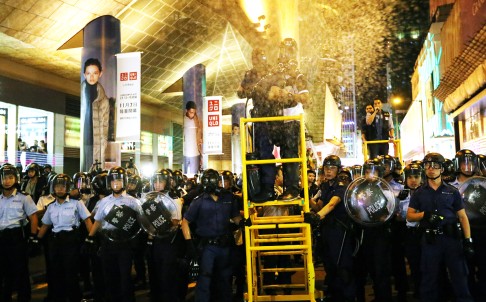
 At least 80 protesters were detained yesterday amid clashes with police during the first round of court-ordered clearance operations in the Mong Kok protest zone.
At least 80 protesters were detained yesterday amid clashes with police during the first round of court-ordered clearance operations in the Mong Kok protest zone.
Police used pepper spray in a vain bid to clear Occupy protesters after opening part of Argyle Street and last night were locked in a tense confrontation with a crowd in nearby Nathan Road.
Police said they would begin clearing the section of Nathan Road that is between Argyle Street and Dundas Street today.
On the 59th day of the occupation, yesterday's removal of barricades from Argyle Street in enforcement of an injunction had been expected to go smoothly. But displaced protesters quickly moved to Portland Street and the one-way street, where barricades were cleared last month, was once again blocked.
By nightfall, protesters had been pushed back to Nathan Road at the junction of Portland and Changsha streets.
"I was outraged. I was on the footpath, with my feet not touching the road," said student Alfred Wong, 18, who was pepper-sprayed.
Several journalists, including South China Morning Post photographer Sam Tsang Kwok-chung, claimed to have been pepper-sprayed by police while covering the day's incidents.
Police Public Relations Branch Senior Superintendent Kong Man-keung said bailiffs had given repeated warnings "but interference was caused by those at the scene".
He said bailiffs, in line with the injunction order, asked police for help and when warnings by officers were also ignored, they carried out "dispersion measures".


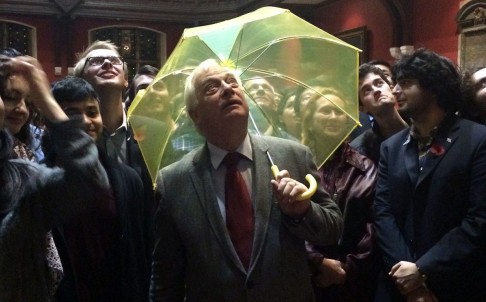
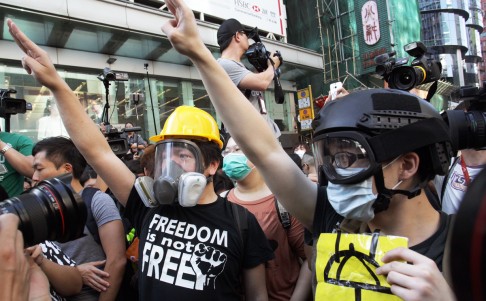

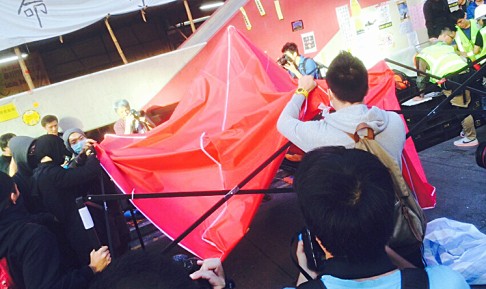


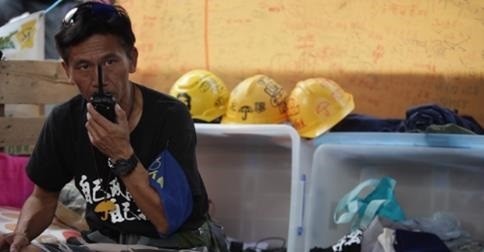
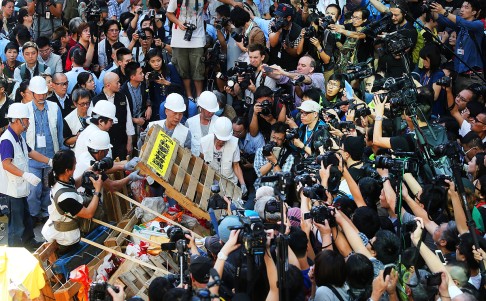
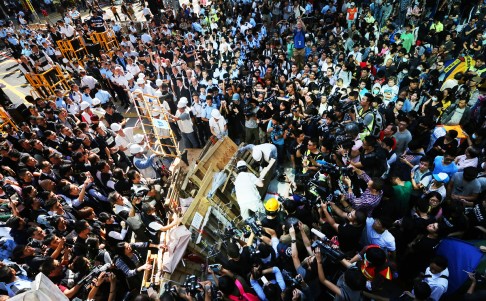
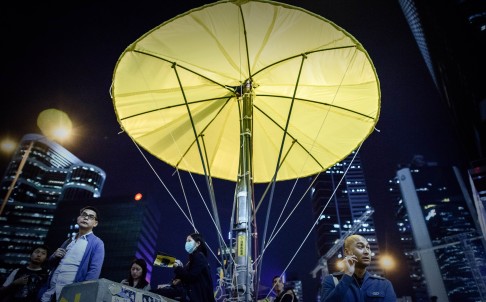
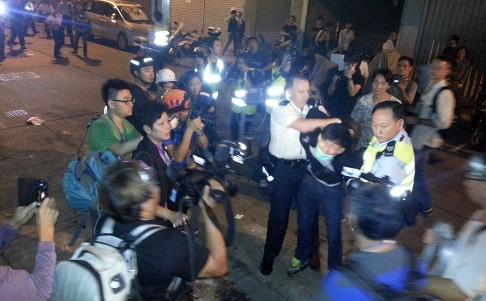
沒有留言:
張貼留言